[In the last three days, people have downloaded fourteen thousand copies of my new CC-licensed edition of The Ware Tetralogy. Go get yours!]
This week I went to visit my old pal Kevin Kelly at his house near Pacifica, a foggy town on the coast just south of SF. We took a long walk along the ocean, talking things over. (Some of the photos today are from Pacifica, a few are from my drive on Rt. 1 down the coast, like at Pigeon Point, and some are from San Francisco and Berkeley.)
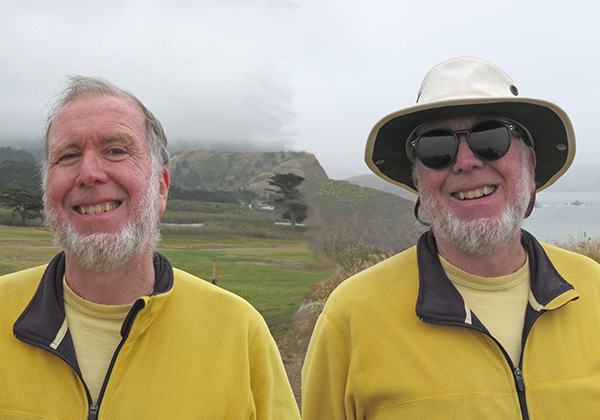
Kevin was one of the first friends that I made when I moved to California in 1986. He was at the first Artificial Life Conference in Los Alamos, he edited the Whole Earth Review in Sausalito, he helped organize the legendary Cyberthon Virtual Reality festival in San Francisco, and he helped found Wired magazine. He still has a Whole-Earth-like website called Cool Tools, he created an amazing photo book called Asia Grace, and he’s ramping up to promote his nonfiction opus, What Technology Wants. You can find links for all these things, and more, on his concisely named website www.kk.org.

That last paragraph sounds kind of like an old-school Whole Earth blurb/review, doesn’t it? “This is fun, weird, crunchy, and it’s good for you!” The prose is infectious. It was great to see Kevin again.
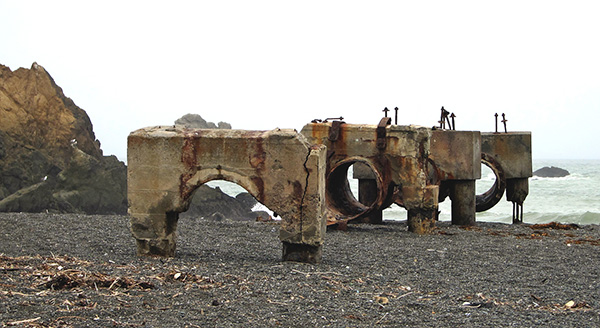
While we were walking, Kevin kept coming back to a series of questions that seemed to be on his mind: “What kind of universe would you create if you were a god? Would it have evolution? Good and evil? Would the inhabitants worship you? Would they be immortal? How would you get information about its progress?”
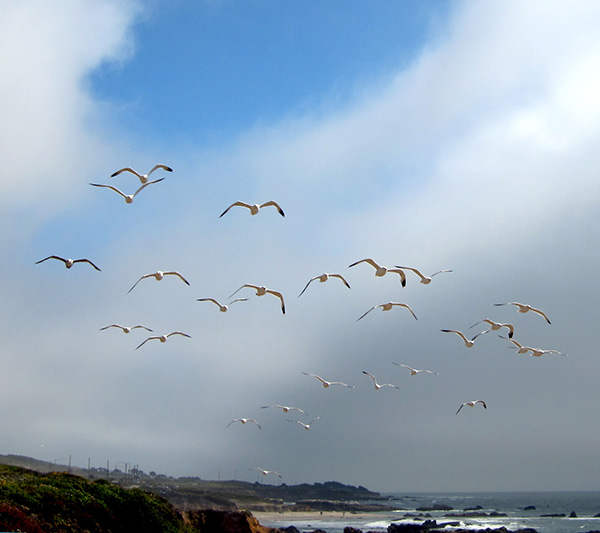
I had a little trouble answering the question—generally, I’m more coherent when I can think things over and write down my answers, or excavate them from past things that I’ve written. The idea of designing universes can, of course, be taken science-fictionally. Now and then some physicists remark that they might someday be able to exploit some kind of subdimensional bosonic fluctuation in order to create a little “pocket universe” that looks small but which contains multitude.

There do seem to black-hole-has-no-hair kinds of physical reasons why you might not be able to see inside your newly-make pocket universe. But SF writers don’t worry about stuff like that. You just set up a telepathic ribbon-theoretic link with one of the minds in the new universe. Or maybe you, like, incarnate yourself down into it.
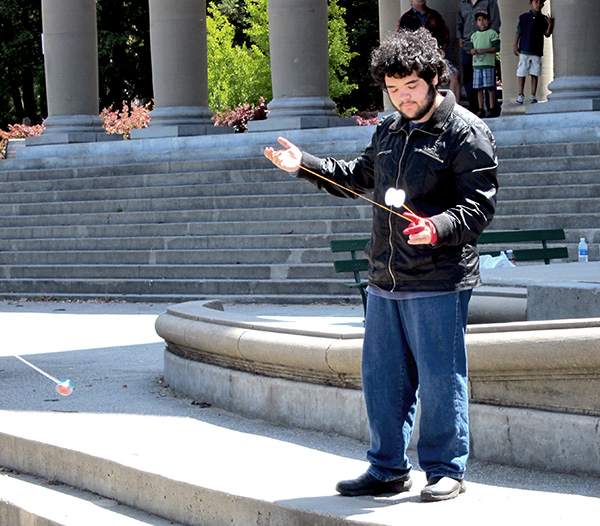
But I’m still circling around the question here, which is what I did in my conversation with Kevin. The reason has to do with my current location in my work cycle. The way I write an SF novel is to imagine a fresh universe that I’d like to inhabit, and then I go into it for about a year, in a waking dream, writing down what I see.

Restating the same thing: For me writing is a little like dreaming while I’m awake. That is, I see the scene in my mind’s eye before I write it. Sometimes I’ll nurse an image of a place or a situation for quite some time before I write about it, in fact I sometimes write a book simply to be able to mentally visit certain locales that I’ve dreamed up. I pretty much can’t write a novel unless I have an image of a fabulous place where I want to go. By writing about these scenes, I make them more real to myself.
My novels are usually about some quirky out-of-the-mainstream individual who finds his way into a completely different world. My hero has adventures in this wonderland and eventually makes it back to Earth. A couple of books back, I realized that, at a transreal level, this plot synopsis describes me¬ working on a novel.

Right now I’m between novels, and at this point, I have no idea what my next one will be about. I don’t know how to get out of here once again. So I was uncomfortable with Kevin’s question.
“I wish I had a wish,” as Andy Warhol once said.
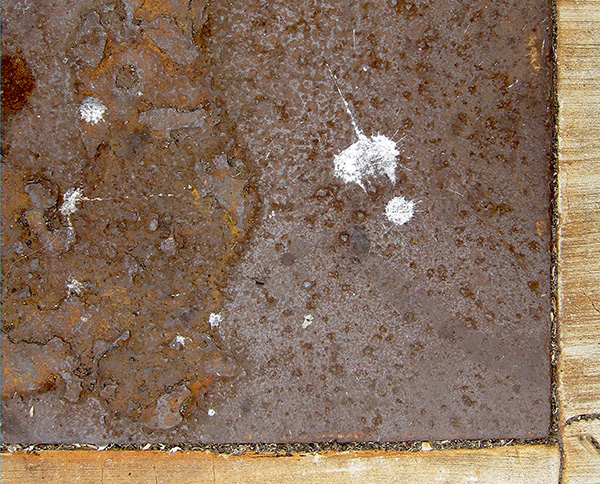
There’s so many nice universes that I’ve already written novels about. Worlds with, variously, four dimensions, actual infinities, predictable futures, telepathy, levitation, races of intelligent robots, cosmic-ray-riding aliens, galactic civilizations, creatures inside the Sun, creatures inside the hollow earth. Where do I want to go next? I don’t know.
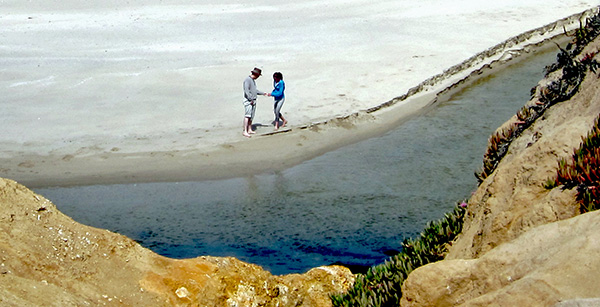
As the time between novels stretches out, I usually begin worrying I’ll never write another, worrying I’ll never think of another world of heart’s desire to explore. At some point the pressure grows so great that I settle on something and get started again. But each time I’m also thinking that maybe this time I won’t go back in and that maybe I’m done with writing novels. At times that seems like a pleasant thought, other times not.

It wouldn’t be out of the question to go back and write a sequel, I suppose. I’d always meant to do a sequel to Frek and the Elixir, with its aliens from the galactic core, and the year 3000 Earth with its funky biotech. There were still a lot of loose ends at the end of that book. Maybe I’ll see if I could get a contract for a Frek 2.

Or, maybe I’ll still think of some completely new world of heart’s desire.
But just for now I’ll be writing a few short stories. Little generation starships instead of complete worlds.









June 25th, 2010 at 9:35 am
I like to think that we’re unknowingly creating our own little pocket universes all the time, only on accident. You might sneeze and cause some kind of quantum perturbation and BANG! there’s a new universe. “And thus on the first day the lord god sneezed and the heavens and the earth were made. And they were good.” (even though the lord god didn’t see them and see that they were good).
And I always enjoy reading the Technium too. I’m seeing KK and RR as prophets of our futures, with KK being the more technical careful prognosticator and RR more psychedelic, far-out. Sort of a left brain, right brain thing.
June 25th, 2010 at 5:35 pm
i just (as in 15 minutes ago) finished “hylozoic” and wanted to see what you’re up to on the internet. what a delight to find this blog!
reading what you have to say, and, interestingly also, looking at your images, i realize something that i hadn’t noticed before: one of the reasons i find it so easy to resonate with you is that you’re so interested in place. usually i’d become aware of that resonance earlier but i guess because your important places are so big (the subdimensions, the hrullwelt, etc.) i didn’t recognize them as such – as if i thought that universes/worlds weren’t places.
thanks for stretching my little mind once again.
June 26th, 2010 at 1:15 pm
I’m happy to hear you’re working on several new stories, but I can’t accept your characterization of the short story form as “little generation starships” as opposed to “complete worlds.” Your best short stories are completely new and fascinating worlds of their own. I’m thinking of “A New Golden Age,” “Tales of Houdini,” “A New Experiment in Time,” and others. Each of these — of eight pages, six pages, and three pages, respectively — are perfect evocations of a unique time and place.
July 3rd, 2010 at 1:42 pm
Creation isn’t the bit that interests me, about gods. It’s what I’d do, as an omnipotent deity, *after* creation, that makes my brain hurt.
Say I were made lord and ruler of a domain, able to sense any activity I wished within my domain and affect it in any way I wished.
My typical thought-model for this is: say a nanotechnological invention granted me alone the ability to make anything into a sensing, thinking extension of myself; and the ability to form any part of me into any shape.
I could then decide “the whole planet will become a part of me, a sensor for me, and a container for my mind with many backups: I shall reap all information from it that I can”. I could also decide “I’ll bud off a large number of human-appearing avatars, to go forth and interact with other humans for me, and the same for all other species”. Or I could decide “I’ll seed the universe with copies of myself, to become the gaias of all planets, and terraform them”.
But given such power, what SHOULD I do with it?
If I grant the power to others, I’ll likely be destroyed.
If I use the power to warn people of coming disasters, or to prevent those disasters, whether they’re disease or tsunamis or whatever, then how will humanity, and other creatures, evolve and become strong and fit to go out into the universe?
If I use the power to interact as one or more members of a society, I will risk altering that society. If I took all the nasty jobs out of sympathy for those that did them, then the members of the society would, over generations, become incapable of doing the nasty jobs.
If I help humanity directly, I will hinder their growth and atrophy their strengths.
Do I want evolution and independence? Or do I want dependence on my protection?
I’ve tried to explore this problem as a short story a few times, but it’s never been tractable.
Ultimately, I decided that simply giving each person on earth a small, essentially powerless but invulnerable companion would be sufficient. But then Philip Pullman went and wrote about dæmons, so that story would just be derivative, now.
July 15th, 2010 at 1:11 pm
quoted from Mr. Rucker’s treatise: “The familiar tools of SF — time travel, antigravity, alternate worlds, telepathy, etc. — are in fact symbolic of archetypal modes of perception. Time travel is memory, flight is enlightenment, alternate worlds symbolize the great variety of individual world-views, and telepathy stands for the ability to communicate fully. This is the “Trans†aspect. The “realism†aspect has to do with the fact that a valid work of art should deal with the world the way it actually is. Transrealism tries to treat not only immediate reality, but also the higher reality in which life is embedded.”
In my opinion, and I’ve experience to back it up, it’s a serious error believe ‘the familiar tools of SF are..in fact symbolic of archetypal modes of perception’. Patterns from the past can at times be appropriately ‘symbolically recognized’, just sometimes.
Time travel (to select one SF tool but this is true of each of them) is about traveling in what we believe is ‘time’, but there’s so much variety in it that who can believe its fixed at any point? Anyone that’s experienced (without drugs, meditation, active imagination, just in ordinary daily life) time slowed down so much that there’s no noise, no sense of movement or very little sense of it has been there, it’s almost unbelievable if you notice it. Apparently its possible to either not notice it or find a reason to ignore it. Anyone that’s experienced taking a step and being suddenly 15 feet away, no sense of having moved, no ‘in between’ has been where ‘time’ is not.
Time doesn’t exist except as a useful tool, a way to establish some linearity, or enough of it not to be in chaos all the time. Symbolism is sometimes useful, but literally the SF tools are introductions to ideas that cannot be described, in the manner that mathematics is about how ideas that cannot be seen can be ‘seen’, in some way.
Perhaps planets do communicate with some ‘other’, and with each other. The first scene in the popular It’s A Wonderful Life is a conversation between stars. Isaac Asimov’s The End of Eternity is not, in my opinion about time travel or a programmer, it’s a description of reality, on a very personal level. Arthur C. Clarke’s Childhood’s End is not symbolic of any thing but reality, in my opinion. Carl Sagan’s Contact is also, its a real description of certain aspects of inner space, how the mechanisms of mind operate on what’s outside the body, and …
July 22nd, 2010 at 10:44 pm
Thank you for the writing tutor Rudy. I loved it and very timely as I just had a friend over last night, a mystery writer, who was giving me pointers on that genre of writing. I’ve written one weirdo novel, some years back, and I feel another one brewing, I have the meaning or personal journey the characters the place and already I feel the voice, but no gimmick or vehicle as yet. Close.
I just finished reading Raymond Chandler’s The Big Sleep for the first time. My first Chandler. I can add him to my fav LA writers list, Fante and Bukowski…all about place.
I spoke with Paul about writing today briefly, he’s still so supportive and sweet. This weekend his old girlfriend Trina Robbins is coming to visit and I’m so looking forward to meeting her, Paul had told me so many wonderful stories.
Such a wonderful blog you have here. xo, cindy lee berryhill